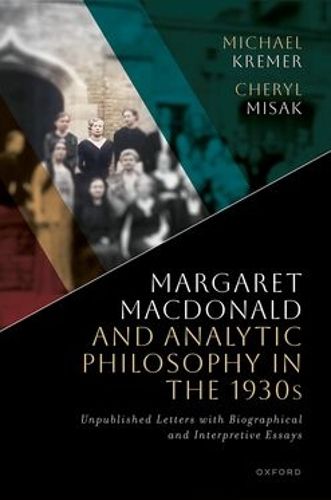Readings Newsletter
Become a Readings Member to make your shopping experience even easier.
Sign in or sign up for free!
You’re not far away from qualifying for FREE standard shipping within Australia
You’ve qualified for FREE standard shipping within Australia
The cart is loading…






This volume examines the important but, until recently, forgotten work of the British analytic philosopher Margaret Macdonald. Macdonald's career spanned one of the most significant and fascinating periods in the history of analytic philosophy: the pre-war London of Susan Stebbing as she advanced philosophical analysis; the Cambridge of Ludwig Wittgenstein as he lectured on his new practice-centred philosophy; the Oxford of Gilbert Ryle and ordinary language philosophy; and the post-war London of A.J. Ayer as he defended a version of logical positivism. In this predominantly male, elite world, Macdonald was an anomaly: a woman, abandoned as a child, raised by foster parents and in an orphanage, poor for much of her life. Remarkably, she made a highly respected academic life for herself. A talented philosopher, she was a major influence on Ryle, and one of those few who really understood Wittgenstein during the 1930s. She also helped found, and later edited, the journal Analysis, and was a serious scholar of C. S. Peirce, introducing his complex work to her British colleagues.
Cheryl Misak and Michael Kremer provide a biographical essay, a transcription of a no-longer accessible paper on Peirce, an essay on Macdonald as a scholar of pragmatism, and an essay on her as a scholar of Wittgenstein. The centrepiece is a set of letters from Macdonald to Max Black, written between 1932 and 1937--a crucial time for the development of the analytic school, embracing Cambridge analysis, Viennese logical positivism, Oxford linguistic philosophy, and American pragmatism and neo-realisms. The letters shed light on the cultural, social, and political situation in Britain in the 1930s and its impact on academic life, revealing that, against the mighty obstacles stacked against them, some women in English philosophy before World War II were able to carve out paths as professional philosophers.
$9.00 standard shipping within Australia
FREE standard shipping within Australia for orders over $100.00
Express & International shipping calculated at checkout
This volume examines the important but, until recently, forgotten work of the British analytic philosopher Margaret Macdonald. Macdonald's career spanned one of the most significant and fascinating periods in the history of analytic philosophy: the pre-war London of Susan Stebbing as she advanced philosophical analysis; the Cambridge of Ludwig Wittgenstein as he lectured on his new practice-centred philosophy; the Oxford of Gilbert Ryle and ordinary language philosophy; and the post-war London of A.J. Ayer as he defended a version of logical positivism. In this predominantly male, elite world, Macdonald was an anomaly: a woman, abandoned as a child, raised by foster parents and in an orphanage, poor for much of her life. Remarkably, she made a highly respected academic life for herself. A talented philosopher, she was a major influence on Ryle, and one of those few who really understood Wittgenstein during the 1930s. She also helped found, and later edited, the journal Analysis, and was a serious scholar of C. S. Peirce, introducing his complex work to her British colleagues.
Cheryl Misak and Michael Kremer provide a biographical essay, a transcription of a no-longer accessible paper on Peirce, an essay on Macdonald as a scholar of pragmatism, and an essay on her as a scholar of Wittgenstein. The centrepiece is a set of letters from Macdonald to Max Black, written between 1932 and 1937--a crucial time for the development of the analytic school, embracing Cambridge analysis, Viennese logical positivism, Oxford linguistic philosophy, and American pragmatism and neo-realisms. The letters shed light on the cultural, social, and political situation in Britain in the 1930s and its impact on academic life, revealing that, against the mighty obstacles stacked against them, some women in English philosophy before World War II were able to carve out paths as professional philosophers.